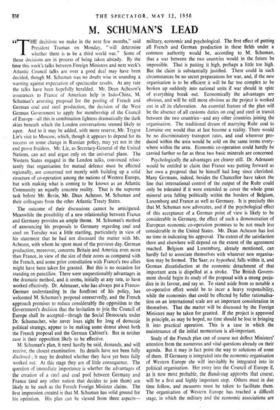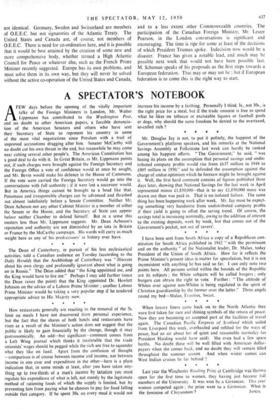M. SCHUMAN'S LEAD „
T HE decisions we make in the next few months," said President Truman on Monday, " will determine whether there is to be a third world war." Some of those decisions are in process of being taken already. By the time this week's talks between Foreign Ministers and next week's Atlantic Council talks are over a good deal may have been decided, though M. Schuman was no doubt wise in sounding a warning against expectation of spectacular results. At any rate the talks have been hopefully heralded. Mr. Dean Acheson's assurances to France of American help in Indo-China, M. Schuman's arresting proposal for the pooling of French and German coal and steel production, the decision of the West German Government to apply for membership of the Council of Europe—all this in combination lightens dramatically the dark skies beneath which the London conversations seemed likely to open. And to it may be added, with more reserve, Mr. Trygve Lie's visit to Moscow, which, though it appears to depend for its success on some change in Russian policy, may yet not in the end prove fruitless. Mr. Lie, as Secretary-General of the United Nations, can act and argue only on the universal plane. The Western States engaged in the London talks, convinced reluc- - tantly that organisation for mutual defence must be effected regionally, are concerned not merely with building up a solid structure of co-operation among the nations of Western Europe, but with making what is coming to be known as an Atlantic Community an equally concrete reality. That is the supreme task before Mr. Bevin, Mr. Dean Acheson, M. Schuman and their colleagues from the other Atlantic Treaty States.
The outcome of their discussions cannot be anticipated. Meanwhile the possibility of a new relationship between France and Germany provides an ample theme. M. Schuman's method of announcing his proposals to Germany regarding coal and steel on Tuesday was a little startling, particularly in view of his statement that he had not discussed the matter with Mr. Acheson, with whom he spent most of the previous day. German production, moreover, concerns Britain and America even more than France, in view of the size of their zones as compared with the French, and some prior consultation with France's two allies might have been taken for granted. But this is no occasion for standing on punctilios. There were unquestionably advantages in the dramatic method, and it seems, initially at any rate, to have worked effectively. Dr. Adenauer, who has always put a Franco- German understanding in the forefront of his policy, has welcomed M. Schuman's proposal unreservedly, and the French approach promises to reduce considerably the opposition to the Government's decision that the invitation to join the Council of Europe shall be accepted—though the Social Democrats under Dr. Schumacher, who never loses sight for long of domestic political strategy, appear to be making some demur about both the French proposal and the German Cabinet's. But in neither case is their opposition likely to be effective.
M. Schuman's plan, it need hardly be said, demands, and will receive, the closest examination. Its details have not been fully disclosed ; it may be doubted whether they have yet been fully worked out. At this stage they are of little consequence. The question of immediate importance is whether the advantages of the creation of a steel and coal pool between Germany and France (and any other nation that decides to join them) are likely to be such as the French Foreign Minister claims. The first impression created is that M. Schuman has solid ground for his optimism. His plan can be viewed from three aspects— military, economic and psychological. The first effect of putting all French and German production in these fields under a common authority would be, according to M. Schuman, that a war between the two countries would in the future be impossible. That is putting it high, perhaps a little too high. But the claim is substantially justified. There could in such circumstances be no secret preparations for war, and, if the new organisation is to be efficient it will be far too complex to be broken up suddenly into national units if war should in spite of everything break out. Economically the advantages are obvious, and will be still more obvious as the project is worked out in all its elaboration. An essential feature of the plan will be the absence of all customs duties on cog and steel in transit between the two countries—and any other countries joining the organisation. The traditional dream of marrying Ruhr coal to Lorraine ore would thus at last become a reality. There would be no discriminatory. transport rates, and coal wherever pro- duced within the area would be sold on the same terms every- where within the area. Economic co-operation could hardly be carried further so far as these two basic minerals are concerned.
Psychologically the advantages are clearer still. Dr. Adenauer would be entitled to claim that France was putting forward as her own a proposal that he himself had long since cherished. Many Germans, indeed, besides the Chancellor have taken the line that international control of the output of the Ruhr could only be tolerated if it were extended to cover the whole great mineral area falling politically within the borders of Belgium, Luxemburg and France as well as Germany. It is precisely this that M. Schuman now advocates, and if the psychological effect of this acceptance of a German point of view is likely to be considerable in Germany, the effect of such a demonstration of European economic co-operation promises to be not much less considerable in the United States. Mr. Dean Acheson has lost no time in indicating his approval. The extent of the satisfaction there and elsewhere will depend on the extent of the agreement reached. Belgium and Luxemburg, already mentioned, can hardly fail to associate themselves with whatever new organisa- tion may be formed. The Saar, ex hypothesi, falls within it, and German dissatisfaction at the economic detachment of that important area is dispelled at a stroke. The British Govern- ment should begin its study of the proposal with a strong preju- dice in its favour, and say so. To stand aside from so notable a co-operative effort would be to incur a heavy responsibility, while the economies that could be effected by fuller rationalisa- tion on an international scale are an important consideration in themselves. That the matter will be discussed by the Foreign Ministerg may be taken for granted. If the project is approved in principle, as may be hoped, no time should be lost in bringing it into practical operation. This is a case in which the maintenance of the initial momentum is all-important.
Study of the French plan can of course not deflect Ministers' attention from the numerous and vital questions already on their agenda. But it may in fact point the way to solutions of some of them. If Germany is integrated into the economic organisation of Western Europe she will inevitably be integrated into its political organisation. Her entry into the Council of Europe if, as is now most probable, the Bundestag approves that course, will be a first and highly important step. Others must in due time follow, and measures must be taken- to facilitate them. The organisation of Western Europe has reached a difficult stage, in which the military and the economic associations are not identical. Germany, Sweden and Switzerland are members of O.E.E.C. but not signatories of the Atlantic Treaty. The United States and Canada are, of course, not members of O.E.E.C. There is need for co-ordination here, and it is possible that it would be best attained by the creation of some new and more comprehensive body, whether termed a High Atlantic Council for Peace or whatever else, such as. the French Prime Minister recently suggested. Europe has its own problems, and must solve them in its own way, but they will never be solved without the active co-operation of the United States and Canada, and to a less extent other Commonwealth countries. The participation of the Canadian Foreign Minister, Mr. Lester Pearson, in the London conversations is significant and encouraging. The time is ripe for some at least of the decisions of which President Truman spoke. Indecision now would be a disaster. France has given a notable lead, and much may be possible next week that would not have been possible last. M. Schuman speaks of his proposals as the first steps towards a European federation. That may or may not be ; but if European federation is to come this is the right way to start.







































 Previous page
Previous page